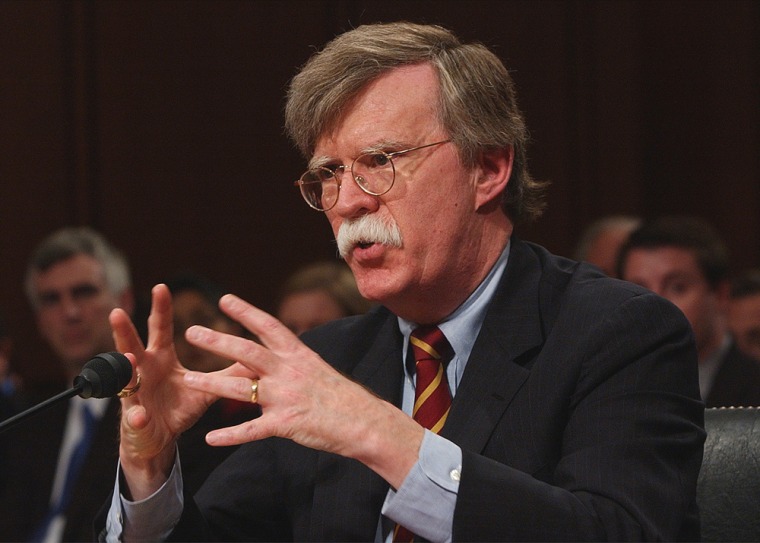Democrats blocked another attempt Monday by the Senate to confirm John Bolton to become U.N. ambassador, delivering a second straight setback to President Bush even as he left the door open to temporarily installing Bolton on his own.
The Republican-run chamber fell six votes short of the 60 it needed to end Democratic delays that have prevented a roll call on confirming the tough-talking conservative. The vote was 54-38 in favor of ending the delays.
The tally left Bush facing stark choices — most of which could leave him appearing weak at a time he is facing sagging poll numbers and fighting lame-duck status six months into his final term.
Wielding a seldom-used power, he could install Bolton during the Senate's upcoming July 4 recess without the chamber's approval. Under the Constitution, the so-called recess appointment would only last through the next one-year session of Congress — in Bolton's case, until January 2007.
Should Bush decide against that, he could withdraw the nomination or authorize further concessions to Democrats who are demanding access to information, some of it classified, about Bolton before they stop stalling.
Vote ended as predicted
Even before the vote, Senate Minority Leader Harry Reid, D-Nev., predicted the Senate would block the nomination again — leaving Bush in a ticklish situation.
"The president will have to make a decision whether he wants to send this flawed candidate to the United Nations," Reid said.
President Bush sidestepped a question as to whether he might temporarily install Bolton in the post if Democratic delays continue.
Bush, asked at a news conference with European Union leaders whether he might use the recess mechanism to temporarily install Bolton, said, “I think it’s time for the Senate to give him an up-or-down vote. Now.”
Bush added: “Put him in. If they are interested in reforming the United Nations, they ought to approve John Bolton.”
Earlier Monday, White House press secretary Scott McClellan did not rule out that Bush would consider a so-called recess appointment during the upcoming July 4 break if the Senate does not approve Bolton’s nomination.
McClellan blamed Democrats for “obstructing progress” by stalling a vote on Bolton. Bush has said Bolton would push for overhauling the U.N. bureaucracy and making it more accountable, while critics say his confrontational style and history of criticizing the institution make him unsuitable for the job.
On Sunday, Secretary of State Condoleezza Rice also left the door open for a recess appointment of Bolton.
Rice, on a trip to the Middle East and Europe, commented in a round of television interviews Sunday as Democrats defended their attempt to block a vote on Bolton’s nomination. They said the administration’s refusal to turn over information they seek is delaying an up-or-down decision.
To determine whether Bolton improperly used intelligence to intimidate officials who didn’t agree with his views, Democrats say they want to check a list of 36 U.S. officials against names — initially blacked out — that Bolton requested and received from national security intercepts he reviewed. They rejected a list of seven names offered last week by Sen. Pat Roberts, R-Kan., chairman of the Senate Intelligence Committee.
Roberts and Sen. Jay Rockefeller, D-W.Va., the lead Democrat on the committee, previously were briefed on the intercept issue and said there was no indication Bolton acted improperly.
Democrats also want documents related to the preparation of testimony that Bolton, as the State Department’s arms control chief, planned to give in the House in July 2003 about Syria’s weapons capability. They want to know if Bolton misled the Senate during his confirmation hearings when he said he was not involved in the preparation of that testimony.
Rice: ‘We’ll see what happens’
Rice, in Jerusalem, said Roberts “has already spoken to the issue of the nature of those inquiries.”
Asked on “Fox News Sunday” whether Bush would consider a recess appointment of Bolton — a temporary placement that does not require Senate approval — Rice said: “We’ll see what happens this week.”
It was unclear whether Rice’s statement was an indication that the administration would seriously consider a recess appointment for Bolton or whether it was meant to increase leverage for White House bargaining with Senate Democrats.
Sen. Joseph Biden, D-Del., predicted that Majority Leader Bill Frist, R-Tenn., would fail in the effort late Monday to end the filibuster. He said Democrats are standing for principle by delaying the vote until the administration provides what they seek.
Sen. Christopher Dodd, D-Conn., told ABC that a recess appointment would send to the United Nations an ambassador “who lacks the confidence of the United States Senate.” That, he said, would “cripple” Bolton as he goes to the world body and damage his standing with the Senate.
